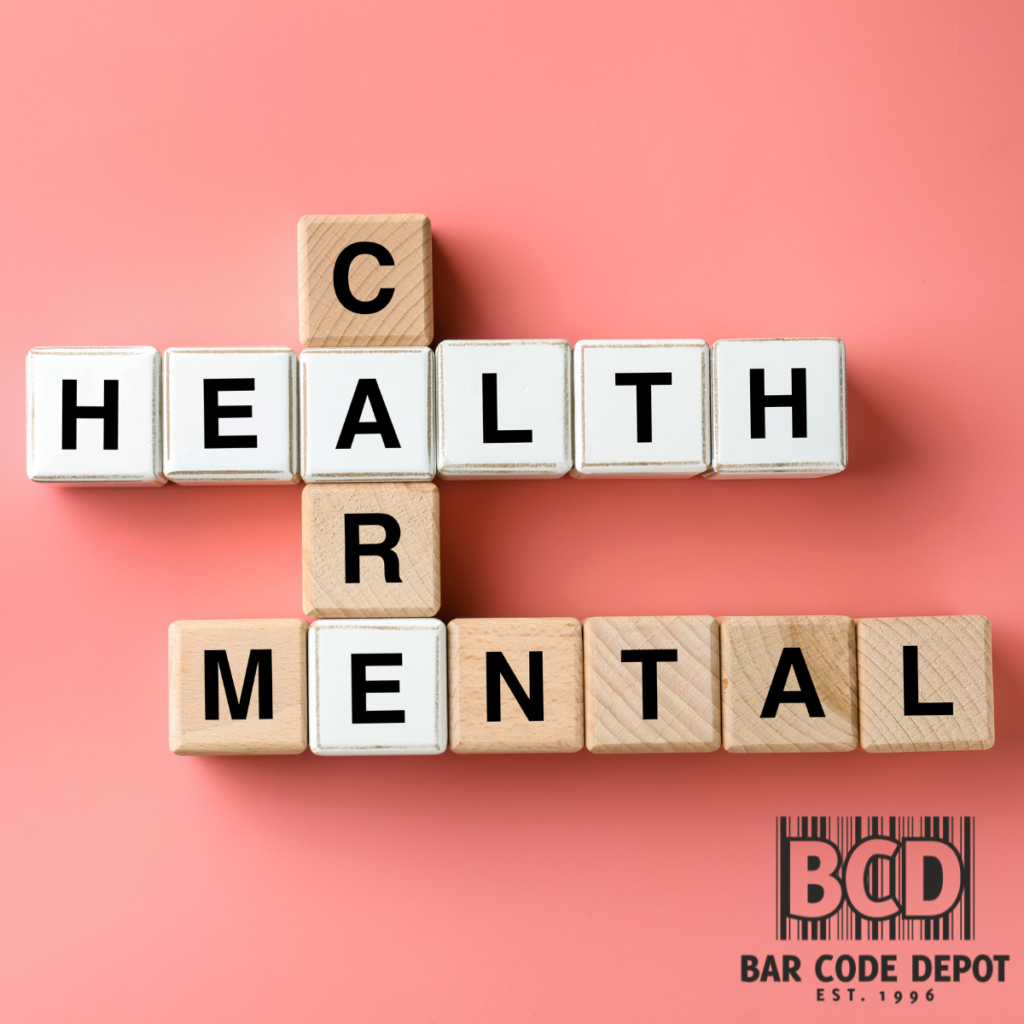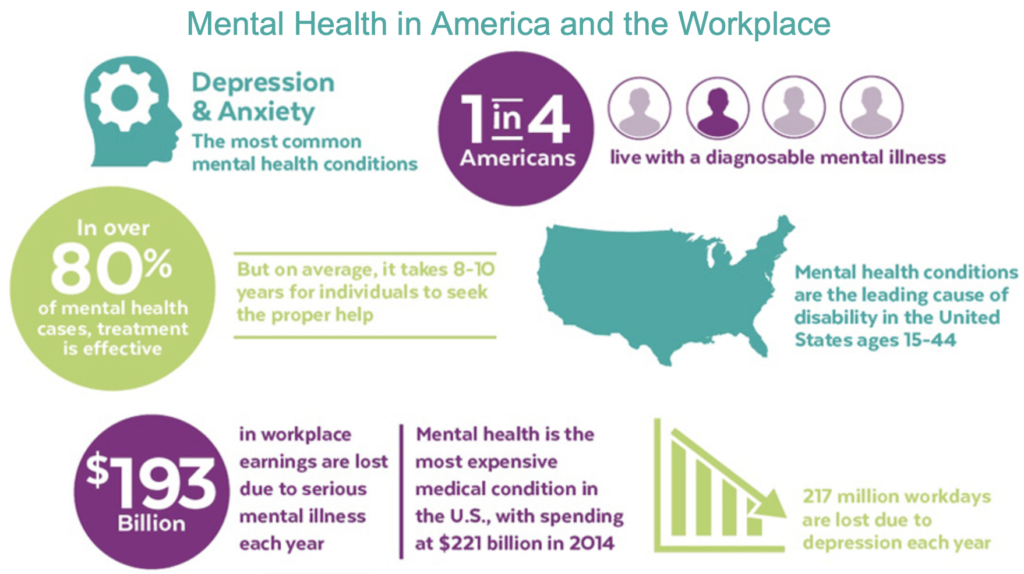
Mental Health Overview
Mental Health might be an uncomfortable subject to address especially in the workplace but it’s one that can’t be ignored. More than ever it’s important to understand what is mental health, what are the signs of poor mental health, and remedies to help alleviate poor mental health. MentalHealth.gov defines mental health as our emotional, psychological, and social well-being. It affects the way we think, act, and feel. If we are not careful, bad mental health can slowly erode all happiness in our lives. That’s why it’s important to pay close attention to the signs of bad mental health. Eating or sleeping irregularly, lack of interest in hanging with friends or family, and having low energy are just some of the signs of bad mental health. Have you taken the time to consider the state of your mental health? It does take some self-awareness to step back and realize your own mental health issues. I know for me personally, I’ve never really given it much thought I think it’s easier to look at someone else’s issues than realize my own. But after some reflection, I realized my own mental health issues I struggle with and now I’m more self-aware and know how to handle those issues. That being said, considering everything we have been through as a society in the last year with the Covid-19 pandemic I think it puts even more stress on the issue of mental health.
“Mental Health… is not a destination, but a process. It’s about how you drive, not where you’re going.” – Noam Shpancer, Ph. D
I think we all struggle with certain mental issues that’s just part of being human, but if they become a pattern, I think that’s when we should be concerned. Luckily, there are remedies like getting outside and going for a walk, playing with your kids, getting adequate sleep, whatever makes you happy you owe it to yourself to do those things. Your happiness should come first before everything. We only have one shot at this life might as well spend it being happy.
Mental Health in the Workplace
The Covid-19 pandemic has certainly added fuel to the fire when it comes to mental health in the workplace. According to a recent survey by the American Psychiatric Association, 62% of Americans feel more anxious than they did in 2019. While that may come as no surprise given all the social issues thrown on top of a global pandemic we’re currently in it’s no wonder Americans are more anxious. Consequently, bad mental health can have adverse effects on employee production including; job performance, communication with coworkers, and engagement with one’s work. One way for employers to mitigate this issue is by implementing a “check-in” system. This would entail a supervisor/ manager to “check-in” with their individual team members every two weeks or once a month to see how they are doing from a mental health standpoint. This tactic will allow the employer to detect early signs of bad mental health that can hinder that employee’s job performance. If a supervisor/manager can determine whether or not an employee has signs of bad mental health then they can take the appropriate steps to make sure it doesn’t poorly affect their job performance.
Solutions to Overcoming Poor Mental Health
To solve an issue you have to be aware one exists. I think that plays a large role in solving mental health issues. Many cases of poor mental health go unseen or unnoticed until it becomes a problem that might have been avoided if it were known when it first began. I believe if we are all more aware of the signs of poor mental health then we all can help combat the severity of it. We’ve mentioned several signs of poor mental health and we even mentioned several remedies to help conquer mental illness but let’s dig a little deeper into how to avoid poor mental health altogether. First, avoid workplace drama/gossip, I believe this is a huge contributor to poor mental health. As humans, we are very social creatures and we care about how other people perceive us. A lot of times we get caught up in the webs of what “he said, she said” and I think this can put a lot of stress on us as individuals. Ultimately, avoiding workplace gossip/drama will greatly improve your mental health. Try it for yourself and see your mental health improve.

Secondly, make micro-goals for yourself, at work but also in your daily life as well. I know for me personally, I’m a goal-driven individual so I love setting goals whether they’re micro or macro. It’s important to see progress with whatever you’re working on whether it be a large project or just a daily task. Too often people work on a big project and dedicate a lot of time and effort to something and don’t see the end result whether it is their fault or not. This can lead to resentment and lack of interest in work because you’re not seeing the “fruits of your labor”. But by setting these micro-goals will help you see progress in whatever you’re doing to help affirm your time and effort is meaningful.
Conclusion
In conclusion, mental health is a growing concern in the workplace. Often times the hardest part is recognizing the signs of poor mental health. Luckily, there are remedies to help alleviate the severity of the effects of poor mental health. Employers should implement “check-in” systems to occasionally check on their employees to evaluate their mental state. This will help employees know their employer care’s about them as well as help mitigate any mental illness detected at the preliminary stages. It’s important for individuals that have poor mental health to practice the previously mentioned remedies of setting micro-goals to help with gaining a feeling of accomplishment to help with their mindset. Practicing this on a daily basis should show positive outcomes which in turn will greatly help your overall mental health. Now that you are more educated on this ever-growing subject make sure to look for the symptoms of poor mental health in your fellow colleagues and to always check in on them periodically.
Sources:
- https://www.mentalhealth.gov/basics/what-is-mental-health
- https://www.psychiatry.org/newsroom/news-releases/anxiety-poll-2020#:~:text=21%2C%202020%20–%20According%20to%20a,between%2032%25%20and%2039%25.
- https://www.cdc.gov/workplacehealthpromotion/tools-resources/workplace-health/mental-health/index.html
- https://www.forbes.com/sites/officedepotofficemax/2021/04/05/how-to-help-support-your-employees-mental-health/?sh=5f2444de7f20
- https://www.right-mindset.com – infographic
